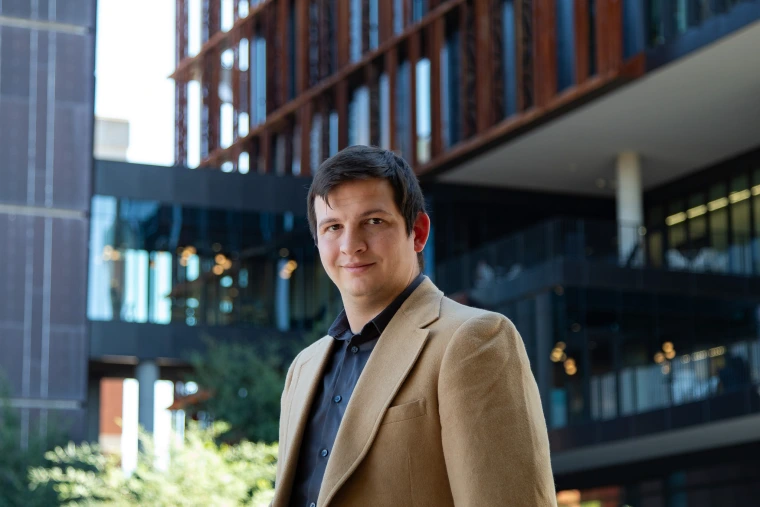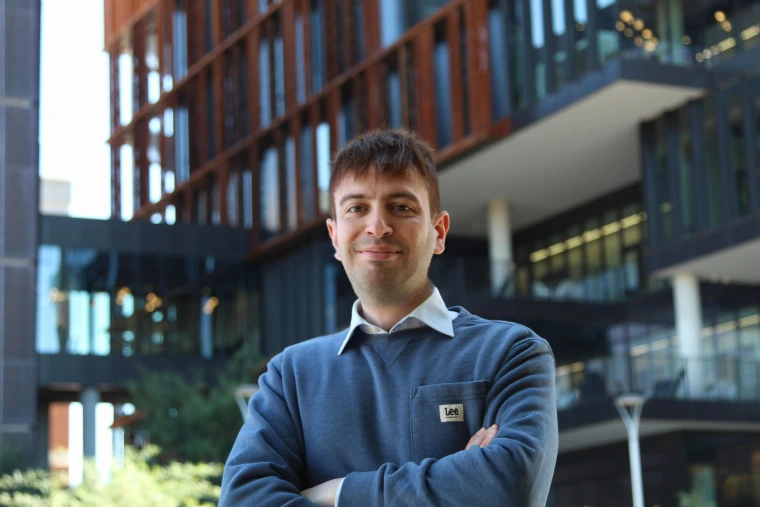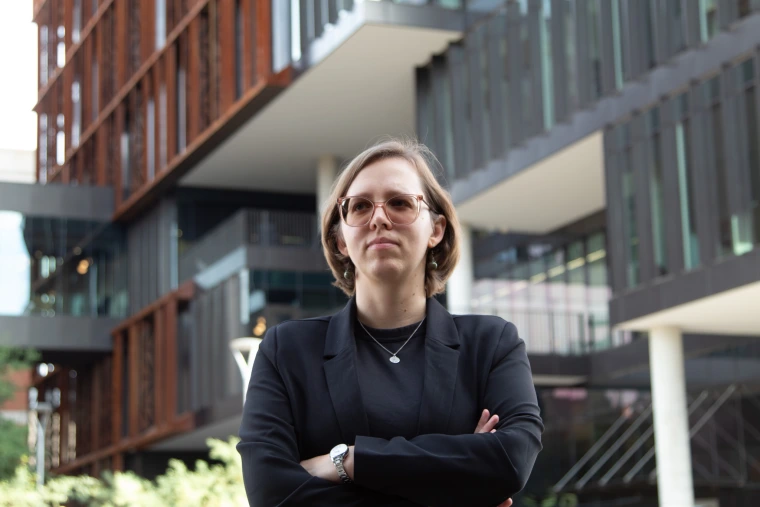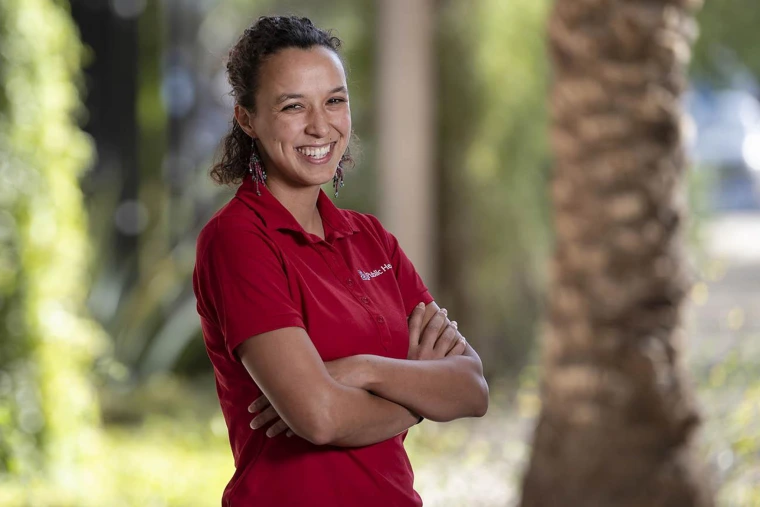2024 Centennial Achievement Doctorate Degree Awards
During the fall of 1987, the Graduate College and the Division of Campus Life established awards to recognize outstanding achievement and contributions of graduate students at the University of Arizona who have shown academic achievement despite facing challenging social, economic, or educational obstacles. Beginning in 2018, due to the philanthropic commitment of past Master’s Award recipient, Dr. William Broussard (MA, ‘02, and Ph.D., ‘07—Rhetoric, Composition, and the Teaching of the English Language) six graduate students were awarded the Centennial Awards. Through Dr. Broussard’s continued benevolence, starting in 2022 seven recipients will be selected and awarded the Centennial Award.
Michael Cardenas

Michael Cardenas (he/him) is a fifth-year graduate student in the Graduate Interdisciplinary Program in Neuroscience, working in the lab of Dr. Katalin Gothard.
Michael grew up in the greater Tucson area and served in the U.S. Navy for four years before becoming the first in his family to graduate college at the University of Arizona. He volunteers with the Center for Neurosciences Foundation, where he helped develop the Social and Emotional NeuroDevelopment, or SEND, curriculum for K-12 students. As a teacher, he fosters curiosity-driven learning by tying lessons to experiences, motivating youth to explore new ways of approaching the world.
Michael's research at the University of Arizona focuses on how brain-body communication informs neural mechanisms underlying decision-making. He investigates drugs that modify bodily states, without directly affecting the brain, to assess their effect on performing decision-making tasks. This approach allows him to examine how the brain responds to changes in the body and how these responses bias task performance. Michael hopes to continue working in research and teaching as a professor in the future.
Michael received an honorable mention from the National Science Foundation and multiple fellowships from the U of A, including the prestigious Richard A. Harvill Graduate Fellowship. He is an ARCS Foundation Scholar and a recipient of the 2023 Young Investigator Award from the National Center for Complementary and Integrative Health, where he presented his work to leaders in the field of brain-body communication. In the summer of 2024, Michael became an alumnus of the Allen Institute's Summer Workshop on the Dynamic Brain, and recently received an NIH Blueprint and BRAIN Initiative Diversity Specialized Predoctoral to Postdoctoral Advancement in Neuroscience Award from the National Institute of Neurological Disorders and Stroke.
Onur Ural Burns

Onur Ural Burns is a doctoral candidate in Second Language Acquisition and Teaching, with a minor in teaching English as a second language and is pursuing a certificate in Technology in Second Language Teaching. He is expected to graduate in 2025.
Onur works as a graduate associate in the Writing Program. His research focuses on education technologies and language teacher education. He facilitates online programs for K-12 teachers and university instructors to develop their digital competence. Some of his work was recently included in the Handbook of Language Teacher Education, published by Springer Nature.
As a first-generation college graduate, Onur is the first person in his extended family to earn a master's degree and the only one currently pursuing a doctorate. Onur relied on scholarships and assistantships from Turkish higher education institutions to continue his bachelor's education. He also received funding from Erasmus, a European student exchange program, to study in the Czech Republic for a semester. He was also a Fulbright Scholar, and he taught at the University of California, Santa Barbara for one academic year.
Onur is from Turkey’s southern coast, a region renowned for its cultural diversity and UNESCO World Heritage Sites. He consistently participated in activities to contribute to his community. When he was an undergraduate student in the College of Education at Çukurova University in Turkey, he volunteered to teach English to children from other low-income families. Most recently, he volunteered to teach English to immigrants online.
Onur's Ph.D. journey has brought numerous obstacles. He faced restrictions on academic freedom from his country, COVID-19 lockdowns during his first two years, and a recent earthquake in his hometown that claimed the lives of his parents. Despite having to overcome these obstacles in pursuit of his educational goals, Onur remains hopeful about what the future holds if he continues to work hard.
Asya Gorlova

Asya Gorlova is a doctoral candidate in the Second Language Acquisition and Teaching Graduate Interdisciplinary Program. Originally from Saint Petersburg, Russia, where she grew up in a family of four daughters, Asya is the first in her family to venture abroad and pursue an advanced degree.
During her time at the university, Asya taught in the Department of Russian and Slavic Studies, where she received the College of Humanities Outstanding Graduate Teaching Assistant Award. She is currently a graduate assistant in Postdoctoral Affairs, supporting postdoctoral scholars across campus.
Asya's research focuses on refugee language education and anti-oppressive, asset-based language pedagogies. Her dissertation explores the role of language learning in refugee resettlement policies and investigates teacher knowledge, perspectives and professional development needs in community-based language programs. Additionally, she participates in collaborative research projects on campus. Asya works with her research partner Angus Leydic on a study examining LGBTQAI+ students' perspectives on language learning materials. She is also an active member of the MACAWS (Multilingual Academic Corpus of Assignments: Writing and Speech) team led by Dr. Shelley Staples, which develops corpus-informed learning resources for Russian and Portuguese language learners and investigates students' and teachers' experiences with corpus-based pedagogies.
Her interest in refugee education is closely tied to her volunteer experiences as a program coordinator with Tutors4Ukraine (2022-2024), a nonprofit organization that provided English language classes for Ukrainian refugees. She also volunteers as an English language teacher with Literacy Connects in Tucson.
After completing her doctorate, Asya plans to pursue a career in educational research in academia, refugee nonprofits or other educational organizations. She hopes to advance holistic research that informs equitable and effective teaching practices, benefiting various student populations and the educators who work with them.
Maiya Grace Block Ngaybe

Maiya Grace Block Ngaybe, originally from Tucson, is completing her doctorate in public health with a focus on resilience informatics. Drawing from her diverse background – including Sudanese, Ethiopian and German heritage – Maiya has developed a strong commitment to advancing global health, health equity and resilience. Her journey has been marked by both professional dedication and personal strength. She has overcome challenges as she navigated doctoral studies and cared for her young child, Asobo.
Maiya's dedication to public health and social justice is evident in her leadership and research contributions. At the University of Arizona, she served as co-chair of the Social Justice Symposium planning committee, helping organize events focused on mental health and resilience. Additionally, she led the Global Health Alliance in the Mel and Enid Zuckerman College of Public Health, promoting student engagement in health issues. As an HSI (Hispanic-Serving Institution) Ambassador, she has been supporting the university's outreach initiatives to underserved communities, helping students and faculty members connect with resources and opportunities.
Through her dissertation work in Uganda, she conducted a discrete choice experiment to understand HIV prevention preferences, an effort that has led to two conference abstracts being accepted for presentation. She has also explored resilience informatics in her research, particularly exploring how informatics can strengthen public health responses to crises such as pandemics and climate change. Her work has been published in multiple peer-reviewed journals, highlighting her commitment to research that advances health outcomes globally.
Maiya has extensive volunteer experience, notably with the Casa Alitas Program, supporting migrant families in Arizona. She also served as a project coordinator for the University of Arizona Health Sciences Alliance for Vaccine Literacy, where she contributed to efforts aimed at increasing vaccine understanding and acceptance.
Following graduation, Maiya intends to deepen her expertise through postdoctoral research and to pursue positions that bridge her passions for data science, public health and resilience. She hopes to leverage her skills in research and leadership to make meaningful contributions to global health equity and community resilience.

